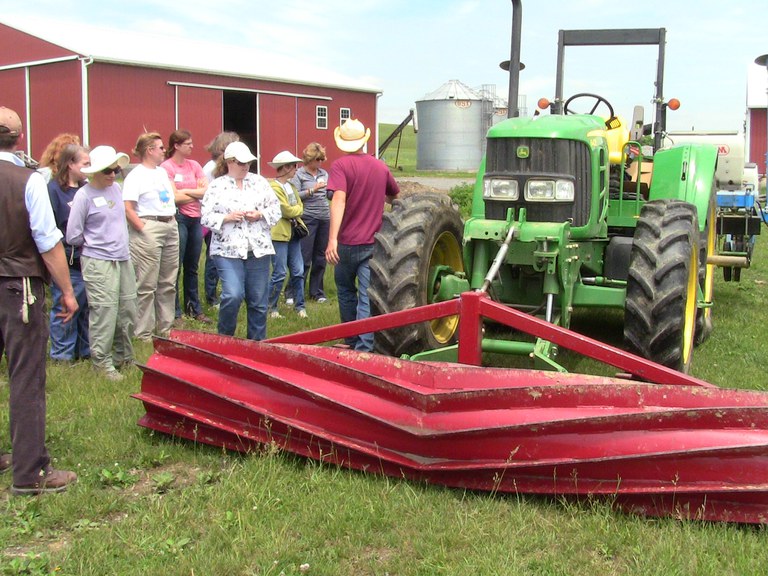PA-WAgN members enjoyed an in-depth tour of Rodale's organic farming research projects.
PA-WAgN and Rodale teamed up again to provide a tour of the ongoing organic research going on at the Rodale Institute farm. This year's tour was hugely successful as participants reported comments such as "Great event!," "Wonderful tour, very educational," "Lab tour was new & very good. Excellent tour guides. Please continue these tours," "Terrific program!!!," and "Very nicely done."
This year's tour started with the Agriculture Supported Community Program (ASC) fields. This is the vegetable fields where regular CSA crops are grown. Rodale has developed the ASC program to help people who can't afford to pay a lump sum at the beginning of the season for their produce. In this system people can pay by the week but they still must pay even if the miss a week. Rodale has a number of drop-off sites in the reading-Allentown area as well as at the farm. Cynthia James, manager of this project, discussed their cover cropping method which also utilizes the roller crimper developed at Rodale. We then moved on to the long-term organic vs. conventional farming trials. Ross Duffield described the research and the success the organic plots have shown and their value in times of drought and severe weather. From here we stopped at the compost area. Dr. Gladis Zinati talked about the trials being run on compost and Rick Carr described how the compost is made.
The tour also covered the high tunnels, plant propagation and compost tea sites. Here Maggie Saska and Rick Carr discussed all the propagation methods used and where the plants are used. Rick showed the group the compost tea and vermicomposting site. He described the difference in aerobic and anaerobic methods of making compost tea and how long the tea can be held. Aerobic needs to be used within hours while the anaerobic can be held for a few days.
From here we moved on to the new homesteading garden. These are raised bed gardens that can be duplicated by homeowners. We then toured the lab space where Rick described all the types of testing that can be done on the plants, soils and composts used on site. This was a new area for the tour and was well received. After lunch provided by Rodale, Inc., we boarded the tour wagon again and toured the bee conservancy and animal operations. Rodale now has hogs, donkeys, beef cattle, chickens, guineas and bees. They are also pasturing organic dairy for their neighbors. Ross Duffield and Stephanie Zimmerman-Schmidt took us through the new hog raising building that is surrounded by pastures planted with various mixes of forage. The new building was designed by Rodale staff and allows pigs to enter and exit as they please. Staff can move animals from one pasture to the next by opening the proper gates to allow access. The goal is to raise 80 hogs per year that are markets to chefs in the area.
Mike Schmaeling, the bee keeper, opened a hive and showed folks the combination hive that Rodale uses. The bees use a top bar method to build comb. They have built up to quite a few hives on site. Mike has also installed swarm catchers in the trees nearby in hopes of bees being attracted to them when they swarm.
Other items of interest were the vertical gardening structures that can be used in urban gardening. Rick had erected a few of these as demonstrations. They have also started some varieties of hops vines. Participants were also given an in-depth tour of the roller crimper with planter. I one-step process of rolling down the cover crop, planting and covering the furrough.
We finished the day with a trip to the store where participants picked up books, clothing, snacks and other educational tools.
Pennsylvania Women's Agricultural Network
Address
302 Armsby BuildingUniversity Park, PA 16802
- Email pawagn@psu.edu
Pennsylvania Women's Agricultural Network
Address
302 Armsby BuildingUniversity Park, PA 16802
- Email pawagn@psu.edu


